#too much organizing with other peopls
Text


[386] @daily-grian Happy Belated 1 year! I hope you three share this cupcake in a civilized manner! :)
#there’s no way this cupcake will lead to a battle of the death right??#nooo#i cant imagine having more then just me as a mod#too much organizing with other peopls#so props to yall#day 386#etho#ethoslab#etho fanart#ethoslab fanart#grian#grian fanart#I need a tag for interactions with other blogs#i like to look back at them lol#i also love the wording a year and some change#uhh i already know i forgot to tag this as something but oh well
814 notes
·
View notes
Text
I will never understand the obsession with making tims favourite robin Jason when it couldn't be more painfully obvious that tims favourite robin was Dick
Like people are so caught up in the concept, the made up angst, that tims favourite robin beat him up that they straight up misunderstand how much more significant Tim and Dicks relationship is not to mention the added layers of Tim originally being created as the ultimate self insert character which for a good number of readers meant they grew up with Dick as their favourite robin and didn't really like Jason just for not being Dick
#dc#tim drake#dc comics#dick grayson#jason todd#can you guys tell tim and dicks relationship is actually really important to me#but yeah#its not like theres no angst in tim and dicks relationship#tim and dick also just feel so much more organic#any time tim and jason have interacted as enemies or allies#it always feels so forced#i hate it#anyway gonna keep shouting about how dick will always be tims favourite robin#its important to my health that i do this#negative#negativity#i said this in my reblog but people still are getting confused so ill add it here too#this isnt a canon vs fanon canon only thing#or else id be a hypocrite#this is mainly a specific thing i dont like bc i prefer this other thing way more
2K notes
·
View notes
Text
it's also telling how whenever there's talk about diversity in the balkans from a western point of view nobody ever gives a shit about the roma and the persecution they face because that would require the west to adopt a slightly diferent worldview when talking about racism and discrimination but like. what did i expect
#this is not me trying to remove responsibility for the antiromani crimes and sentiment that is wide spread in the balkans it's just interest#ing to me how they're simply never included in these types of conversations same as with any other minority groups especialy in eastern euro#pe but also i don't want to talk too much about this because i am not romani and if you wanna know more about this you should seek out their#organizations cause they do a lot in terms of educating people and trying to better the living conditions of roma communities#ura.txt
80 notes
·
View notes
Text
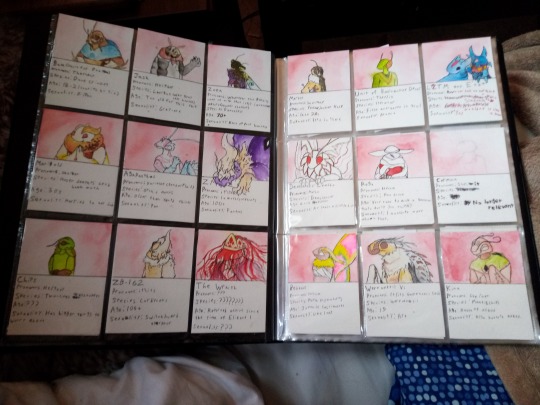
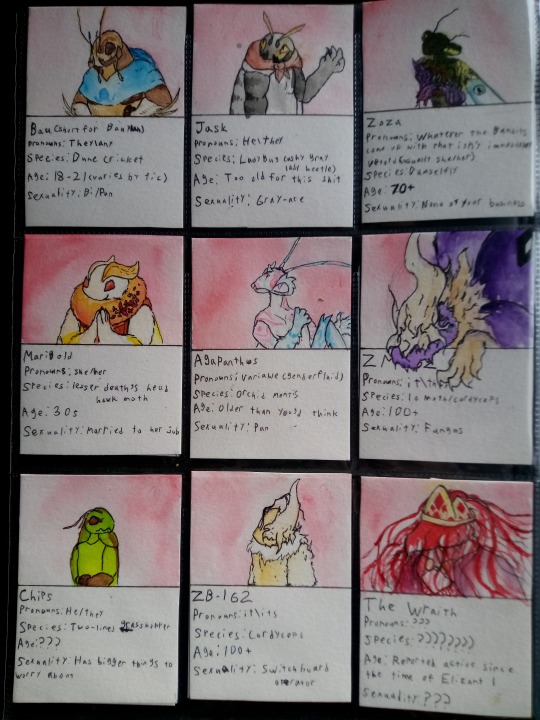
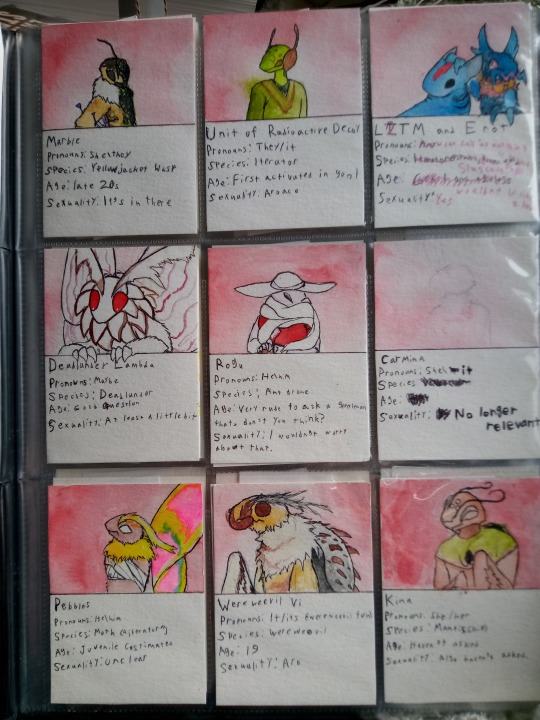
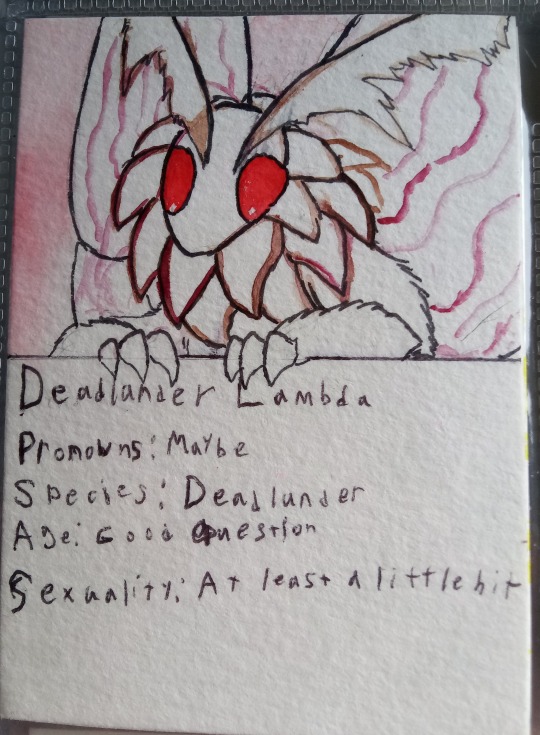

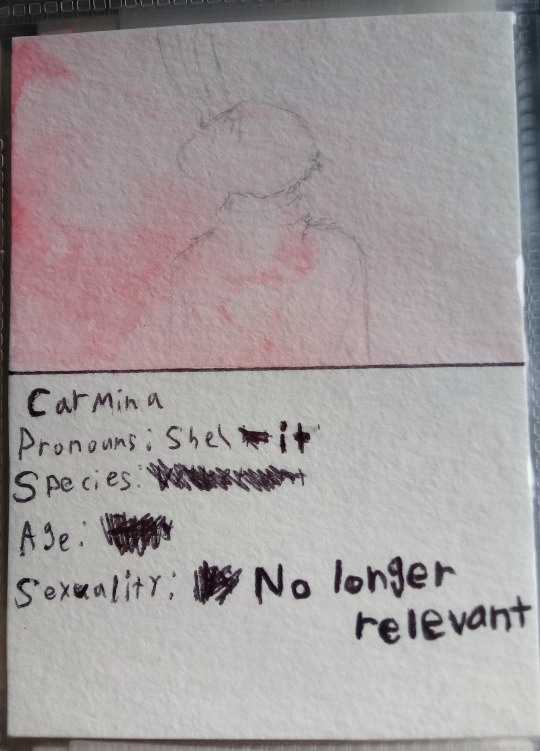


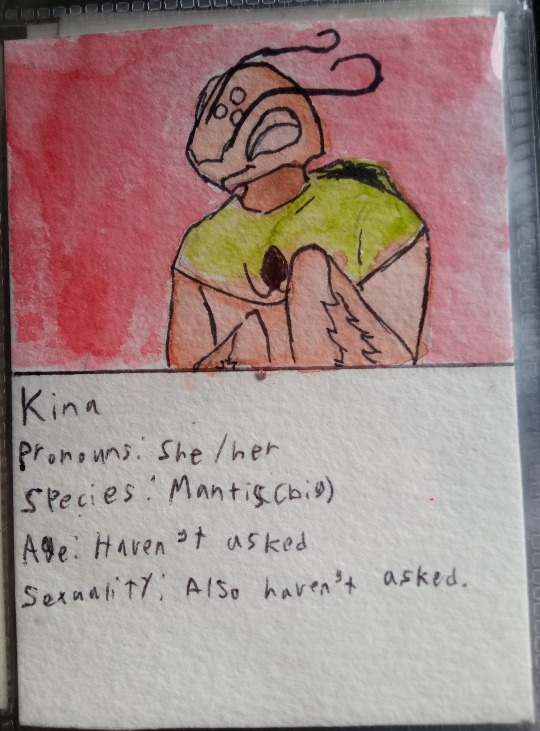
We have finally finished this project, and thus, The World's Worst Dating Sim is finally DONE! Just in time for April Fools Day. Now, with our six new contestants, choose, uhh... who's dateable? Or not dateable? This last batch was determined almost entirely by People Telling Us Who To Add, contains multiple AUs, and is... hmm. "Unconventional" may be a good term? Half of these are probably undateable but you can still shoot your shot.
As previously, it can be a platonic date if you want, you just can't be neutral. Deadlander Lambda belongs to @cordycepsbian and has been moved into our studio for duration of this poll. Profiles below the cut.
(we're linking the first poll here)
Deadlander Lambda - Maybe - Deadlander - Good question - At least a little bit
This, uhh...
...is this safe? We don't think this is safe. ..."Already had kids before"? What do you mean it's a parent?
...well, we can't get it out of the studio, so it's an option now? We guess? This... really doesn't seem like a good idea.
Rogu - He/him - Ant drone - Very rude to ask a gentleman that, don't you think? - I wouldn't worry about that.
A charming mystery from somewhere only described as "a faraway land", though he wasn't quite scheduled in this lineup, we think we can make an exception. This silver-tongued bug seems to be able to say just what's needed to get under your skin... and from the look of it, he's angling to take you somewhere private.
...come to think of it, haven't we seen that face before? On a poster, maybe? Well, it's not a surprise he's been modelling for things, he's certainly got a pretty enough face for it, but why do we feel... nervous, all of a sudden?
Carmina - She/(scribbled in)it - (illegible) - (illegible) - (illegible)(scribbled out with "No longer relevant" written in its place)
...where is she? She was meant to show up hours ago. What on earth could have held her up this long?
Pebbles - He/him - Moth ("iterator") - Juvenile (estimated) - Unclear
Right out of surgery, this one. While we're not sure if it's entirely responsible to include this one, and we certainly don't speak whatever language he's speaking... he's cute, isn't he? And looking for a home? Well, maybe if you're the sort of person who might want to rescue a domestic moth in a bad situation...
Wereweevil Vi - It/its (wereweevil form) - Wereweevil - 19 - Aro
Pre-existing hangups mean that you can only date this one in wereweevil form. Good luck.
Kina - She/her - Mantis (big) - Haven't asked - Also haven't asked
Well, we assume that you can do less lethal than the bandit who people mostly know thanks to her former job as a corpse disposal unit, but some people might be into that sort of thing, honestly. Are you, perchance, also a mantis?
#our art#bug fables#finished#watercolor#ocs#other peoples ocs#deadlander lambda#monsieur scarlet#carmina#five pebbles#wereweevil vi#kina#valentines#or we're tagging it as such for organization its actually an april fools poll#we treat the two events with about the same gravity so it fits#for clarification purposes: five pebbles is several centuries old and would be very offended at being called juvenile#however he is less than an inch tall and built like a stick and doesnt speak bugnish at all#so he spends most of his time lurking beneath furniture and trying to bite people with his new mouth. much to the hospitals distaste.#although the wereweevil is vi or at least an aspect of her it is not a terribly sapient one#it is hungry and afraid and desperate and lashing out in search of any pack#in search of ANY connection it can find#and the only way it knows how to do that is by violently mauling everyone and everything in its path so uhh good luck bucko#wereweevil vi in normal form has way too many hangups over intimacy to agree to an outing and must be approached like a feral cat#we know about the normal timeline and we added extra years so that she has the time to acquire more problems#thus ends our FAQ. good luck#EDIT: typo in the tags. ough
18 notes
·
View notes
Note
what do you think of the theory that Vincent is a death god now?
Hey Anon! Well, I used to be pretty against it, but nowadays I think it all depends on what we currently know about Shinigamis, which is to say not much.
What I mean is that, in ch105, Yana revealed that Shinigamis are former humans who killed themselves...

...however, we do not know if that's the only way for a human to become a Shinigami.
Remember, Yana could hold onto some additional truth that we have yet to figure out, especially considering that since ch105, Sensei strongly hinted several times that the Shinigamis' higher ups are super sketchy. [x][x][x]
In other words, there is possibly a real gap between what Shinigamis themselves believe to be the truth whereas the actual truth is hidden by the higher-ups.
Additionally, that's just my opinion but, seeing as UT (and the possible other deserters he works with) is very anti higher-ups, I wonder if editing the records (to make dead people into BD) is not an idea he got from finding out some truths about Shinigamis, which led to his desertion. [x]
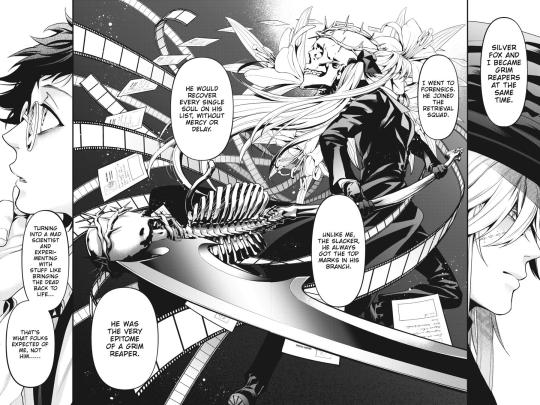
For example, maybe all Shinigamis had their records altered in order to become Shinigamis ? And if that's the case, then maybe some altered memories (read: lies) were put to their records, making them all believe that they're overworked slaves "because of suicide" when none of it is true? Just like the redemption reward is also probably a lie.
All that to say that I believe UT's BD project is a hint to a big and terrible truth that we have yet to fully grasp (take it as a rebellion towards the Shinigamis' higher-ups, on top of UT missing the dead Phantomhives) so, for now, I think it's important to be very careful about the "truth" we were told about the Shinigami Organization.
Back to Vincent: for now, I believe that he was definitely murdered.

Meaning that if suicide is really the only way for a man to become a Shinigami, then he did not become a Shinigami. However, if becoming a Shinigami is not just about suicide, but about several other factors, then it's not impossible that Vincent became a Shinigami after he died. ¯\_(ツ)_/¯
In my opinion, Yana-sensei made sure not to rule out the possibility in canon, as in, she left a few hints that could be red herrings, just like they could be used to interpret that Vincent is not really "dead". Those hints are
1) ch107.5, because, even though he's supposedly dead, he wears gloves and a suit that could resemble that of a Shinigami's.
Additionally, even if the rosette power thing was just for comical effect, it's interesting that he showed up at all even though UT said he cannot be brought back as a bizarre doll.

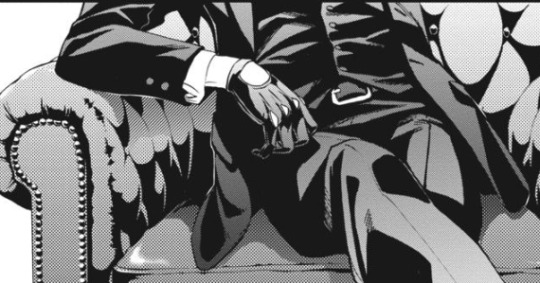
2) the state of his body, that UT mentions in ch105.
After all, if it's burnt so badly, that means his cinematic record can't be read and thus altered to turn him into a BD, so how certain are we that they buried Vincent's body?

3) the fact that he constantly breaks the 4th wall despite "being dead" (ch107.5, short story "with Father", etc), which so far has no explanation in canon.
All of these could be nothing important, because Yana's simply playing around with us, just like they could be significant on some aspects.
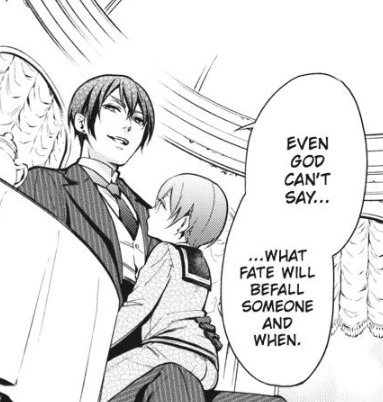
The point is : the more the story goes, the less we have a reason to believe that what Sascha explained in ch105 is entirely true. Not with UT and possibly other deserters actively working against the higher-ups, without a real explanation from their side so far.
TL;DR the possibility of Vincent having become a Shinigami can't be entirely ruled out and won't be, until we have found out the entire truth about the Shinigami Organization.
Is the key to their fate really suicide ? Or are there other actions in life that will turn someone into a Shinigami post mortem? Until a deserter, UT or somebody else, tells their version of the truth, I will not trust the information we've had in canon so far about Shinigamis.
(Personally I'd rather he's truly and definitely dead, but if him becoming a Shinigami furthers the very important plot thread of the Shinigamis' higher ups being absolute assholes who need to be taken down, then I'll be okay with it.)
Sorry if it's a bit confusing, but there's no way to be sure of anything on that topic. Have a good day Anon!
#kuroshitsuji#vincent phantomhive#undertaker#shinigamis#kuro105#kuro107.5#tw: suicide mention#kuroshitsuji theory#anon#answers#my analysis#demons can play make-believe with humans so who's to say that shinigami higher ups don't have an equivalent method that has to do with CR#do you imagine the potential of altered memories in the cinematic records for the plot?#higher ups using this method to control & threaten people or influence world scale events ?#the shinigami organization brainwashes its slaves: you can't change my mind#and even if UT's reasons for starting the BD project are mostly related to the P family#it's likely that it also ties with why he deserted and if not him then other deserters are bound to be actively against the higher ups too#UT is pro freedom so it's possible that he dislikes the watchdog duty so much because it killed Claudia and Vincent#but also because that collar the Phantomhives have on reminds him about his fate as a shinigami#especially if the Watchdog duty was given to the P family because of their lineage#UT needs to mourn better but I don't think that's all there's to him which is why he's so interesting and so relevant to the plot#also why Sensei said “he's not exactly a villain”
78 notes
·
View notes
Text
i can change my profile description thing back i guess, should i go back to "these are the cliff's notes of pain" or the other one i've been tempted with sometimes, which is... where ok there's a lot of variations to what amounts to a semi-facetious existential comparison to henry darger while ducking certain key attributes/having very stark differences besides, but, i have yet to optimize the best one, and i don't if that's slightly too obscure a cut for people to take as a joke or not,
#sporadic warbling#i have a lot of good ones but i'm not a chronic description changer so it needs to be something i won't go Why Did I Do That within a week#like 'organic nightly broths' or 'D.I.D. THUNDERDOME' or 'profoundly limp pizazz' or 'radially symmetrical wife'#or other such esoteric inside jokes there's a lot deep in my sanctum#'pneumatic potato delivery tubes' was a good one too#i know you miss 'welcome to cyclops hell' i do too but i want febreeze#from software lesbian henry darger with internet access thus avoiding the maximum tragedy of an outsider artist's isolation#with way more going on than anyone ever suspects even to those with whom the passion is shared#....but that is not what i would call a snappy marquee ysee#hello people who read all the tags hiii i'm kind of in the stratosphere atm not bc i'm on anything my brain's just weird#and i ramble like a loon much more than i used to hiii
14 notes
·
View notes
Text
so, except for that one painting i still wanna finish im gonna tone down the OC stuff again, zelda work resumes now (°ー°〃)
#ganondoodles talks#if i was skilled enough to just do eintire sketch pages and half comics#im sure it would be more liked#but man am i not able to do that#i feel like i need to rethink every design too bc i just feel im missing something crucial#and writing lore out like i did feels so much more “cringe”#like idk drawing a comic or writing a full story about the tragic past of a character with all context youd have at that point#works alot better than talking about it in bullet point format#thats what i mean#the rough draft is gonna take a bit still .. and all the rewrite stuff is still in my head#its all there but getting it all out is hard especially with time#feeling like im constantly letting people down and losing a race over and over bc im never that articulated or organized as mayn others#everything is chaos about my works no matter how well working it is in my head
18 notes
·
View notes
Text
'Beyond This Power of My Nature': Hera’s self-perception and relationship to humanity
Okay, this is something I’ve wanted to make a proper post about for a long time now: what evidence we have for how Hera sees herself in canon, why I think it’s important to acknowledge she is written with an element of physicality, and how I think, keeping the themes of Wolf 359 in mind, Hera as an AI Character comes across very differently from a lot of other AI Characters. The idea that she is fundamentally human has different implications in the context of a show that is so focused on humanity, and specifically on the way that its characters (at various points) navigate, reject, desperately try to hold onto, and are repeatedly denied recognition of their humanity. There’s so much more I could say on the topic, but. This post is already over six thousand words, so it will have to do.
tl;dr: Hera’s identity is not representative of AI Identity in any broader sense, even just within Wolf 359. Hera has a defined internal self image that is singular, and distinct from the Hephaestus or any systems she runs. There is an aspect of physicality to the way she is written, performed, and treated by the text, and she canonically experiences physical loneliness. Her feelings of isolation and the ways she is othered, even by herself at times, are reflective of very real human experiences - in particular, I have to touch on how I feel Hera can be read as a trans character. Hera struggles with the feeling that she is inherently different from everyone around her, and therefore intrinsically doomed, and it is only by letting go of those fatalistic notions, realizing she and her friends are more alike than different, that she can start to move forward and imagine a life for herself.
A couple of disclaimers:
For the purposes of this post, assume that ‘personhood’ (recognition as a full and equal person to any other person) and ‘humanity’ (the quality of Being Human, however nebulously defined) are separate, albeit related, concepts. Assume that ‘personhood’ is a given for all sentient beings as far as the text is concerned, even if other characters within the text may not extend the same courtesy.
I’d also like to say that I know the subject of Humanity as it relates to AI characters can be a touchy one - I’m also coming at this from the perspective of someone who finds it a little distasteful to ascribe a Human Identity to characters who already have their own, complete, distinctly non-human identities, or to place Humanity on a pedestal in a sci-fi context where humans are the peers of other sentient beings. I don’t think these concerns apply to Hera, or to Wolf 359 as a show, but just to be clear: everything I want to say here is about Hera, specifically. It’s not meant to apply to other AI characters, even within Wolf 359, and it definitely isn’t meant to be viewed through the lens of real-world AI development. I believe Wolf 359 is a character drama above anything else, and I believe it is especially concerned with its exploration of humanity - something I’ll talk more about later. With that said:
i. ‘some do. i don’t.’: other examples of AI identity in wolf 359
How much do we know about general concepts of AI identity in the universe of Wolf 359? The short answer… not much. The slightly longer answer:
When Minkowski introduces herself to Hera, there’s this exchange:
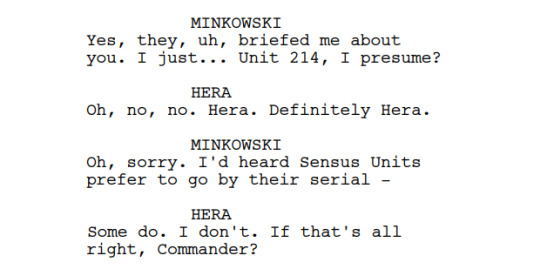
(Ep. 61: MINKOWSKI: Yes, they, uh, briefed me about you. I just... Unit 214, I presume? / HERA: Oh, no, no. Hera. Definitely Hera. / MINKOWSKI: Oh, sorry. I'd heard Sensus Units prefer to go by their serial - / HERA: Some do. I don't. If that's all right, Commander?)
Minkowski says she “heard Sensus Units prefer to go by their serial [numbers]” and Hera responds, “Some do. I don’t.” … It’s entirely possible that both Minkowski and Hera are going off of Goddard propaganda here, or that Hera doesn’t know what other Sensus Units might think at all and she’s just trying to defer to Minkowski before making a request of her. But for all we know, maybe that’s true? Maybe some Sensus Units really do prefer that. And whether it’s true or not doesn’t really matter. In saying it, Hera acknowledges that all AIs may not feel the way she does, but that this is how she feels about her name.
In Change of Mind, we have this exchange between Eris and Lovelace:

(Suddenly, behind her, there's a soft WOOSH! Lovelace spins around and - finds herself face-to-face with a YOUNG WOMAN. / ERIS: Hi. / Lovelace blinks. Confused. / LOVELACE: Hi? What - who - / ERIS: It's me. Eris. / LOVELACE: But... I thought you were an A.I. / ERIS: I am. This is how I see myself. Well, how I see a version of myself. As long as we're both in a mental state, we can interact this way. Remember, you're not really here either. / LOVELACE: But... look at you. You're - / ERIS: Yeah. I know.)
I’m not going to speculate on exactly how Eris appears in this scene, but: “This is how I see myself. Well, how I see a version of myself.” is interesting to consider, both in the context that Eris has an internal sense of self (presumably human in appearance, as far as the stage notes go) and the suggestion that there are other ways she sees herself that might be equally ‘her’ - does this mean Eris as in the Eris we know in Change of Mind, or does it imply that each iteration of Eris, in each of the training modules Goddard uses her consciousness for, perceives herself differently? Both? Neither?
And I think it’s revealing to show these two lines next to each other:

(LAMBERT: Rhea says... “It’s just the way they programmed her, back off.”)

(Ep. 7: EIFFEL: C’mon, Commander, you can’t really hold that against her. It’s just her programming! / HERA: Oh, stop. Do you have any idea how condescending that is? Just chalking everything I do to my programming? What if I just went around blaming every stupid decision you made on... “biology”? / EIFFEL: Hera... / HERA: “Why are they doing that, isn’t that a bit dangerous?” Oh never mind, that’s just their biology. “That’s a terrible idea, don’t they know any better?” Just that pesky ol’ biology, we really should’ve sprang for the more expensive model.)
… Which. I kinda think the difference in philosophy there speaks for itself. Sure, Rhea’s line is in defense of Eris, while Hera doesn’t appreciate ‘it’s just programming’ being used as a defense of herself, but I find it hard to imagine she’d ever see it as anything but condescension.
It also might be worth noting that none of the other AIs we know (despite how little we know about them) seem to be people Hera would really get along with: Enlil is the exact “willing to roll over for any bozo in a lab coat” type of AI who gets the “cushy job flying jet liners over the Atlantic” she shows such disdain for; if Hera met Eris it would likely be under circumstances where Eris was a threat to her friends + despite Eris’s ‘rogue AI’ aesthetic, she is designed to serve that purpose by Goddard and serves her role (and accepts her fate) without much resistance; and we don’t know much about Rhea, but from her defense of Eris, and what we can interpret from her limited interactions as a sense of professionalism, she and Hera also… likely would not see eye to eye.
All of that to say: we don’t know much about AI identity as it broadly exists within the setting of Wolf 359, but I think we do know enough to fairly assume it’s as varied and individual as identity would be for any other group of people. Which… of course it would be. I think it’s entirely possible that some AIs would have a sense of self-identity that is entirely divorced from human categorization. And all of this presents a ton of questions that I don’t really have answers for, that I don’t think we even have enough information about in canon to properly speculate on, but I think it’s important groundwork to lay out to further emphasize: when I talk about Hera’s identity, I am talking about Hera’s identity. How she sees herself, how she wants to be seen, what she values, etc. as an individual person. So.
ii. ‘you’re remembering this wrong’: what the subjective reality of memory can tell us about hera’s self-perception
If there was only one scene I could call attention to here, one piece of evidence re: Hera’s identity and self-perception, it would be the opening scene from Memoria. If you want to, please just go listen to that scene again, right now. Notice how it’s framed, and what the audio cues might suggest in a visual medium - in her memory, Hera perceives herself at the table with the rest of the crew. Physically present.
So much of Memoria is about subjective reality, memory as the product of the world through your own personal filter, your perspective and biases. “Everything before memory is about the world around you. Everything after it is all in your head.”
So looking at how Hera remembers things, more than anything else, I think can tell us a lot about how she perceives herself. Even when she doesn’t realize it. ‘Minkowski’ in Hera’s memory says… well. We get this scene:
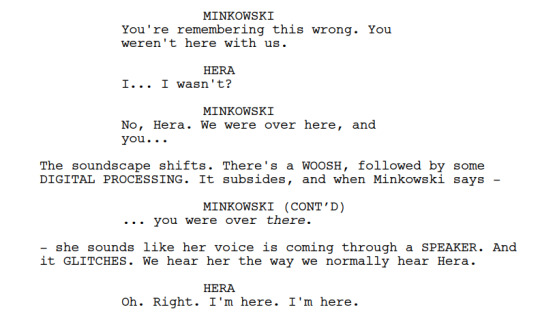
(Ep. 41: MINKOWSKI: You're remembering this wrong. You weren't here with us. / HERA: I... I wasn't? / MINKOWSKI: No, Hera. We were over here, and you... / The soundscape shifts. There's a WOOSH, followed by some DIGITAL PROCESSING. It subsides, and when Minkowski says - / MINKOWSKI (CONT’D): ... you were over there. / - she sounds like her voice is coming through a SPEAKER. And it GLITCHES. We hear her the way we normally hear Hera. / HERA: Oh. Right. I'm here. I'm here.)
But here’s the thing. Minkowski - the real Minkowski - would never say Hera wasn’t there with them, because from Minkowski’s perspective, she was. This is Hera’s perspective - Hera feels as if she wasn’t there. And to quote @the-empty-man, from a similar conversation we had a while back: ‘in the actual reality of that Thanksgiving meal, she was there with them in the sense that she could directly see them and hear them and interact with them in various ways and (if we think of her as being located in the Hephaestus) she was kind of sharing the same physical space as them. In the reality of that memory, she was as "there with them" as she ever has been with anyone (excluding weird mind-space things) but that didn't feel like enough for her. If she doesn't think she was fully there with them then (or at least a part of her doesn't), then she's never felt like she's been fully there with anyone (again maybe excluding mind-space weirdness). It's like she's got this longing for something that she barely even has a frame of reference for.’
I think that’s just it. Hera experiences physical loneliness. The wording of “over there.” The shift in sound design, and the implication that Hera hears the others the way they hear her - that she’s not an equal presence in a different form, from her own perspective, but physically somewhere else on the other side of an impassable barrier that the others don’t even recognize exists. She has an image of herself in her mind that most other people never see.
Still, ‘how does Hera see herself?’ is a difficult question, and not one I’m going to be able to answer all at once. For now, it might be useful to first point out how Hera definitely, canonically does NOT see herself - she does not see herself as the Hephaestus.
In her own memory, she imagines herself as singular, physical, (by all indication) human in appearance. Without the awareness that ‘mind-space weirdness’ is even possible, that appearance is for no one but herself. And the Hephaestus, I think, is an entity in its own right, and one that Hera is bound to for most of the show, but she exists within it, not as an inherent part of it. Her connection to the Hephaestus, the functions she performs, are her job. The further into the show you get, and the more Hera asserts her own autonomy, the more the text distinguishes between Hera, the systems that she runs, and even her hardware. And, of course: “Or end up in other places. Doing things not because you're good at them, but just because of what you are. Has it ever occurred to you that there might be jobs for which the only requirement is having no pulse?”
iii. ‘i know what’s waiting for me back there’: when and why hera rejects humanity
It’s important to note that Hera’s identity absolutely is informed by the fact that she’s an AI, and the way she navigates the world and her relationships because of it. At times, this creates something of a double bind for her - it’s frustrating to have others acknowledge her situation, when it others her and creates or emphasizes a reminder of the distance between them, but it’s also frustrating when they don’t recognize she can’t always do the things that they can do, or that she has other physical/safety/etc. concerns that wouldn’t occur to them.
Consider the part in Theta Scenario where Eiffel has them vote on whether or not to return to Earth and sheepishly has to add, “and, uh… all those without hands?” The progression of this scene is a good illustration re: Hera’s alternating refusal of and embrace of humanity: she blames her loneliness on her programming, her attachments, her humanity - she chooses to separate herself from these things without ever making an affirmative statement as to what part of her would be Her in their place. That’s because it’s coming from a place of hurt. And remember that she’s still dealing with Maxwell’s betrayal. This is an emotional reaction, which I suppose is worth noting in itself: when Hera is hurt, her judgment is clouded, and she can be confidently wrong. Consider how convinced she was that Hilbert was making everything about Decima up, while she was at the height of her anger with him.
When Hera is hurt, when she is feeling betrayed, and frightened, she tends to self-isolate - she leans into the idea that she is fundamentally different and therefore intrinsically doomed. It’s only by letting go of these preconceptions and allowing for real connection that she’s able to heal. It’s true that the only people who have hurt her have been humans - but so are the only people who have ever helped her, who she’s had any meaningful relationships with at all. She has to believe she isn’t fundamentally different from the others, because ultimately that’s what allows her to return home with them - to think maybe there could be something for her on Earth after all. And by choosing to believe in Eiffel’s promise to her, that whatever happens when they get back to Earth, they’ll go through it together… That's a start.
iv. ‘i know where this train goes, i've been on it before. "she'll hurt someone. she can't be trusted. it's okay - she isn't even human.’: hera, lovelace, and real-world alienation
I think it’s also worth noting, however, that while Hera’s identity is informed by being an AI, the implication of Being an AI in the world of Wolf 359 specifically manifests in ways that are directly applicable to real-world human experiences. The double bind that I described, the lack of life experience compared to your peers and the embarrassment associated with that, the feeling of alienation and isolation, even the feeling of being ‘not quite human’ through repeated dehumanization and othering - these are things that real people experience. In the same way that Lovelace is an alien clone, yes, but more importantly just a person with PTSD… Hera is an AI, but she’s also a person with anxiety and chronic pain - and with experiences that I think can be directly drawn to neurodivergent, disabled, and trans experiences in various ways. I’ll try not to get too into that aspect of it here, but I do think it’s worth noting - Wolf 359 is a show about humanity, about people whose humanity has been denied to them in various ways, interpersonally and/or systemically, and I think it’s important to consider Hera’s character arc and the ways she chooses to assert her autonomy and self-identity within that framework.
And of course, speaking of Lovelace, it’s impossible to ignore that Hera is the most staunch and immediate defender of Lovelace’s humanity, following the realization that Lovelace is herself an alien clone, because Hera recognizes the way others react to her perceived differences with fear, distrust, etc. and how they will use those feelings to justify dehumanizing her. Lovelace’s humanity and Hera’s humanity are directly linked in the text.
v. ‘it’s like you’re making a movie’: why i think it does hera’s character arc a disservice to approach it with general biases regarding AI characters
You know that thing about how Wolf 359 leans into sci-fi tropes? How Eiffel is the wisecracking everyman, Minkowski is the by-the-books Commander, Hilbert is… well, you know. And so on. But instead of being subversions of these common archetypes, the characters in Wolf 359 are as intricate and contradictory and dynamic as they are because a central tenet of the show’s character writing is to ask ‘why would a real person behave this way?’
If we extend that logic to Hera and interpret her as an example of the ‘AI who is more human than some humans’ archetype, then the answer to the question is simply… because she is fundamentally human. The failure of that trope, in my opinion, is that it often sets up an AI character in the position of ‘becoming’ human, suggesting humanity is something greater and aspirational, and often directly equating ‘being a person’ with ‘being human’, even in settings where other non-human and equally sentient forms of intelligence exist. There’s something self-aggrandizing and patronizing in that.
But this is NOT the case with Hera; she is just as human at the start of the show as she is by the end of it - her struggle is not in ‘attaining humanity’ but in navigating the biases of others, the way repeated dehumanization has affected her own self-perception - to get others to see her the way she sees herself.
vi. ‘such a big, big universe...’: isolation, the ‘big picture’, and what the contradictions in am i alone now? tell us about hera’s priorities
Here’s a line I think about a lot. Specifically, I think about how often this line is used to represent Hera… “Such a big, big universe, and you only gave yourselves the tools to think about a tiny portion of it.” It’s fascinatingly ironic when you put it back into context: consider the way this monologue is framed. She’s telling all of it to Eiffel, but she isn’t, really. That’s the conflict. She wants to be able to tell him these things in the same way she wants to be able to describe what she sees to him, to get him to understand her experience, because she can think about so many more parts of that big, big universe at once, and what does it get her? She can’t do anything with it. She can’t tell anyone. She ‘tells’ Eiffel anyway - she chooses to talk to him, even when she isn’t actually talking to him. She can’t make that connection, but she wants to, so badly.
She thinks she’ll be left alone up there, sooner or later. It’s a feeling she learns to let go of, little by little, until something else finally seems possible.
There’s a theme throughout Wolf 359: the ‘Big Picture’ as an antagonistic force, whether it’s alien and unknowable, or corporate and uncaring, or some combination, and how its counterpart is Personal Connection. That’s something I’d like to get into in more depth in another post, but it’s worth touching on here because I think keeping that in mind reframes so much of Hera’s monologue in Am I Alone Now?
Think about how much of it is those Big Ideas in contrast with the familiar and immediate - that she wants to tell these things to Eiffel. “Some days I wonder if I’ll miss you, after you go away forever… I doubt it. But you never know.” The subtext is in the contradiction. The lonelier Hera is, the more she denies her humanity, but in her denial, in her loneliness, that humanity becomes all the more apparent.
Sometimes I see people take ‘I doubt it’ at face value, as evidence of eventual character/relationship growth, suggesting she gets more attached to him over time… I don’t think that’s true. She watches a star die 13.7 light years to the left and she thinks of him. She watches the swirling, raging solar winds in colors she has no name for, and wishes she could share that with him. She’s not talking to anyone, but she still chooses to talk to him. Of course she would miss him. Of course she would.
vii. ‘even hilbert never sunk that low’: how hera is treated by the show’s antagonists
It might be interesting to note that almost all of the antagonists do acknowledge Hera’s personhood, and that the way they treat her is almost always a reflection of how they treat other, flesh-and-blood people. The only antagonist who seems to honestly see her as less than a person is Hilbert, and even in his “tell me you’re not mourning that appliance” levels of cruelty towards her, there’s a way that it’s not so different from his general disregard for human life and ability to see people less as individuals, and more as expendable assets to be used in pursuit of a Greater Cause.
With that said, he’s not particularly relevant to the discussion of Hera’s self-image. The characters who are: Maxwell and Pryce.
viii. ‘i can totally rewrite a memory’: hera and maxwell
I think this is where the distinction between personhood and humanity becomes most relevant. Because I think Maxwell believes very strongly in AI Personhood, and I believe she generally prefers the company of AIs to human people, and I think… those facts allow her to help Hera in a way no one else could have, but they work against her understanding of Hera as an individual. Let me try to explain.
From the moment Maxwell gets on board the Hephaestus, she starts altering things in Hera’s programming - little things, like Minkowski’s title, that Hera can ignore because the larger things that Maxwell is able to fix for her genuinely improve her quality of life. And Maxwell, despite showing compassion for Hera, uses more mechanical terminology to refer to her than almost anyone else. But the thing is… while the SI-5 certainly have no qualms about blatant and intentional cruelty when they deem it necessary, I don’t know if Maxwell realizes what a violation some of these things are. She helps Hera, sure, unquestionably. But she also betrays her in what might be the worst possible way.
Think about the way Cutter threatens to delete and alter Hera’s memories - in Decommissioned, and in the live show. It isn’t fundamentally all that different from what Maxwell wants to do in Memoria, but Maxwell seems incapable of understanding why the concept is so upsetting to Hera. I don’t think we have enough information to make any claim for certain, but I do think it’s possible that other AIs may not perceive themselves in the same way Hera does, or value the same things. There’s a chance this is not malicious at all, but just a failure to recognize Hera’s priorities as an individual do not align with Maxwell’s previous experiences. With that acknowledged, Hera defends Maxwell against the idea she might turn her against the others, saying, “Doctor Maxwell understands better than anyone how much of a violation that would be. She would hate herself.” … but does she? Would she? Does it matter, when she does it anyway?
Hera is distraught over her realization that she never really knew Maxwell, but I guess I like the idea that maybe Maxwell didn’t understand Hera as well as she thought she did either. That maybe Hera’s unpredictability is something beyond programming, something closer to the same messy, complicated human quality that the rest of the crew survives on - that Hera was able to catch Maxwell off guard and win against her for the same reason they all triumph over Pryce and Cutter in the end. Because human unpredictability is the one thing that Goddard’s Big Picture can never factor for.
ix. ‘you don’t look like me’: hera and pryce
And if there’s any relationship that can tell us about Hera’s self-image, it’s this one. Pryce is fully aware of Hera’s humanity. Pryce’s collar program (and Maxwell’s, for that matter - another link between them) serves a similar function to Pryce’s restraining bolts, but as far as Pryce is concerned, I think it’s actually preferable to her that Hera is aware of it. “They could be whatever she wanted them to be - and as real as she wanted them to be - and they never left her behind... and they never talked back... and they were never afraid of her. Except when she wanted them to be.” …
Likewise, Hera’s attachment to her own identity is necessary for Pryce’s methods of control to be effective. Pryce is able to hurt Hera by dehumanizing her, by degendering her, by taking away her name and her autonomy, by reminding her that even her own voice isn’t her own - because those things matter to Hera.
So then you have that line in the finale, where Pryce sees Hera in Eiffel’s mind and she says, “You don’t look like me.” I think there are a few different ways you could read that.
One, the more common interpretation: that Pryce expects Hera should look like her because she is functionally ‘designed in her image’ and that Hera, over time, intentionally shifted her internal sense of self away from that. And I like this, I think there’s a power in it, especially alongside headcanons where Hera adopts some features of the people she loves to incorporate into her own - but I think it might be the less likely option. While I think it’s entirely believable that Pryce would give Hera her appearance in the same way she gave her her voice, and while I think there is an intentional cruelty (and given that Pryce herself was probably isolated for much of her life, perhaps a kind of awful retribution in her mind) to Hera having human desires without human physicality, I don’t think all of that is just Pryce’s design. I think that’s giving her too much credit.
The other possible interpretation: canonically, Hera is able to be in Eiffel’s mind by interfacing with Pryce’s neural imaging processor, which is presumably configured for Pryce. She is intentionally running a whole bunch of extra code to appear as herself instead. I don’t know. There’s something about that idea, to me. That by default, more easily, she could choose to appear the way Pryce does, but that it matters to her that she doesn’t.
(I also kind of like the idea - given the transhumanist nature of Pryce and Cutter - that the way Hera appears in the finale is distinctly human. I think it works well with the themes of the show - that where Pryce rejects her innate humanity, considers it weakness, considers herself above it, tries to transcend it… Hera recognizes the strength in her own humanity, for all the ways it fails her, embracing it has allowed her connection to others that she would’ve thought impossible, has made her more free, has made her more herself.)
And again, if there’s anything that tells us about Hera’s self-image, it’s this: we know from later events in the finale that there are ways she could’ve interfaced with the machine without appearing in Eiffel’s mind, but she wanted to. She wanted to be there, as herself, as ‘physically’ as possible, and be seen. If you don’t count her punching Pryce in the face (which… I guess it counts as a type of interaction), the only direct physical interaction Hera ever has with another character in the entire show is the stage note that says: Hera and Eiffel stand together, his arm around her shoulder.
x. ‘[gritted digital teeth]’: physicality in the way hera is written and performed, and how that informs her as a character
A bit of a tangent, but speaking of physicality. One thing I always like to point out is how, in the live show, they chose to have Hera on stage with the others, but just… far enough away from them, physically. And the only person who ever crosses the stage to interact with her directly is Eiffel. Of course, you can’t take any of that as a literal expression of… anything, but I do think it’s worth considering in the context of Hera’s physical loneliness expressed in Memoria, the way Eiffel consistently tries to bridge the gap between them via emotional connection, and, finally, Hera’s lone physical interaction in the show being with Eiffel in the finale.
There’s also the (albeit mostly circumstantial) detail that Michaela Swee recorded a lot of the show remotely, with the notable exceptions of Memoria and Brave New World - the two episodes where Hera has ‘physical’ appearances.
And if we’re going to talk about the way choices in the writing/acting impact the way Hera’s character comes across, there’s this screenshot I managed to dig up from Gabriel Urbina’s now-defunct blog. I think it’s worth noting that, as well as expressing physicality within the text of the show, she is also admittedly written with, performed with, and informed by those aspects of physicality, even when it’s not visible to us - in that sense, from a metatextual perspective, you could even argue she has just as much physical presence as any other character in the show.

(Someone says, “Okay so I was a little wary of watching the live show, mostly because of Hera. I didn’t want her personified. But the way Mikaela [sic] Swee portrays her character, puts Hera on that stage, is perfect.” to which Gabriel responds, “A perfectly understandable concern, but hopefully one that’s not too prevalent after you watch the show. There is so much of Michaela’s mannerisms and physicality in how we write Hera and the vocal performance that hopefully seeing her perform it will amplify the character that she’s created rather than narrowing it down.”)
xi. ‘i know plenty’: challenges to hera’s identity, self perception, and connection to humanity
So, why am I so caught up on the humanity part of this? Because I think Wolf 359 is, before anything else, a show that is concerned with humanity. I think it is a show about very human people (in some very flawed and tragic ways) trying very hard to retain their humanity in inhumane circumstances, and often with people actively trying to dehumanize them, whether interpersonally or through corporate alienation, human experimentation, the treatment of prisoners, etc. But that leads into a whole other topic, so instead I’ll share these three things:
This exchange from Out of the Loop, where Hera’s argument with Jacobi hinges on humanity - her accusation that he “works so hard at being inhuman” and her anger and offense at his retort that she wouldn’t know what that means:
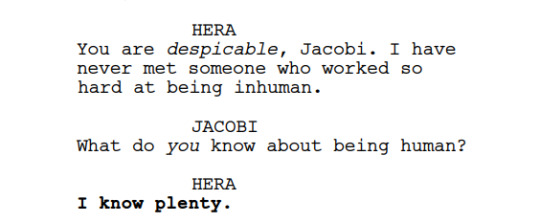
(Ep. 49: HERA: You are despicable, Jacobi. I have never met someone who worked so hard at being inhuman. / JACOBI: What do you know about being human? / HERA: I know plenty.)
This line, from Quiet, Please, where Minkowski defends Hera’s autonomy directly and refers to her as a woman, which I promise will be relevant:

(Ep. 58: Minkowski SLOWLY, maintaining her VICE-LIKE GRIP, PULLS HIS EAR DOWN, bringing Jacobi's face down to her eye-level. / MINKOWSKI (low, deadly): Shut. The Hell. Up. That woman? For the last two weeks, she was the only person who even tried to resist what Pryce and Cutter were doing to us. So you are going to show her some goddammed respect, am I clear?)
And because I’m incapable of writing lengthy meta about Hera without bringing up this quote from Sarah Shachat in some capacity:
“What I can tell you is that the fact Hera that clearly has a human gender in her speech and conscious perspective, yet lacks human physicality, is something she definitely does think about. She isn’t removed from it, or taking the view of some sort of Hyper Advanced Future Machine for whom human binary constructions are funny, if a bit quaint. She’s been placed on a spectrum the same way she was placed aboard the Hephaestus. Her journey so far has very much been about dealing with that, about trying to assert her unique sense of self given the limitations placed on her and to communicate with these other idiots who don’t share her experience.”
While this is about Hera’s relationship to her gender in particular, I think the fact that she sees herself as a woman specifically is relevant. The fact that she has a human gender and she cares about that, and that human concepts of identity in general do apply to her. She doesn’t consider herself separate from or above them.
And that leads, perhaps, to one more question. Is it possible that Hera sees herself as human not because of an innate desire for the attributes of humanity, but because all of the people she knows are human - because once you conflate personhood and humanity on a societal level, is it possible she feels that she will only be seen as a complete person if she is also human? And, I mean… Maybe? It’s possible. But I don’t think it changes the outcome.
I’m asking this here because I think this is also analogous to a trans experience. If you have social expectations of what a woman is, and you feel that you are a woman, and so you choose to conform to those social expectations (to whatever degree) because it allows your womanhood to be recognized… as long as the desire for those attributes comes from a genuine place, can you really tell if you would feel differently about it if society viewed womanhood differently? At some point socialization, societal expectation, and personal preference do get muddled up to a certain degree, and while it’s worth examining to make sure you’re doing what makes you most comfortable, whatever that may be… I think at a certain point ‘I feel better presenting this way than not’ is the only real answer you can find.
I think this also applies to Hera, in her connection to humanity and her expressions of/desires for a kind of physicality. We have a sense of how she canonically perceives herself, and how she struggles to be perceived by others, and with that in mind it’s largely irrelevant to me how she might feel about her identity with social pressures removed. Identity is shaped by connection, and while I waver on how much I want to say that Hera is human, full stop, no qualifiers… She is a person with human desires who wants to be close with and share experiences with her human friends. She is an AI, and that informs her identity and the way she navigates the world, but I don’t believe those things are mutually exclusive.
(I’ve written a little more about why I think Hera’s character arc reads as a trans narrative here.)
More than anything, I have a hard time believing that Hera would want to be seen as fundamentally different from the people she loves, when struggling to overcome that difference both within her own self-perception and in her interactions with others, is such a significant part of her character development. There are times where Hera being an AI does mean she has to consider things that the others might not, and it’s important that the people in her life are aware of and respectful of that. But to emphasize her differences in circumstances where it’s not relevant only serves to other her.
Or, let me put it this way. Whether or not Hera would want a body, if she could have one, is a whole other set of questions, but if Wolf 359 is a show about humanity, about connection, about the value of small, personal things over the Big Picture, then I think if Hera was able to hug her friends, if she was able to go somewhere by herself, entirely by herself, and put her hands in the water, and feel it… even the fact alone that she might have the desire for those things… Well, maybe there’s a way that Wolf 359 is about that, too.
xii. ‘if this is it? i’d rather go as me, thank you very much.’: conclusions
I often see people say that we have ‘no way of knowing’ how Hera might want to be seen, or even that she definitely wouldn’t want to be seen as human, or that it wouldn’t occur to her to want [whatever thing] because she’s ‘not human’ and I just… I don't think any of those things are true. I think there’s plenty to go off of in canon, and I think it all points more in this particular direction than not.
I once saw someone say - as a criticism - that Hera was less of an AI character and more of just “a person in the walls” and that stuck with me because… well, because it was such a funny way of phrasing it, but also because. That’s not a weakness of the writing or a failure of imagination. That’s the point of her character! There are so many other sci-fi stories that are interested in more speculative questions re: how AI characters might be different from us and prioritize different things. That’s not Wolf 359! Hera is not meaningfully different from the others, she just thinks she must be because she has different life circumstances and has been treated differently.
And I understand why people are wary about ascribing ‘human’ qualities to AI characters, given the track record of a lot of science fiction, and the reasons a lot of people might relate to AI characters in particular. I really do. I just believe that in this particular case, with this particular character, and the themes in this particular show, it would be doing Hera a disservice to ignore these aspects of her self-identity that she so clearly canonically struggles to come to terms with, when her physicality in the finale in particular is so much a culmination of this fight to be seen - in both a literal and metaphorical sense.
I believe the tragedy of Hera as a character is that she is written to be fundamentally human, with physical desires, physical loneliness, an internal self-image that - except under extreme circumstances - she can never show to anyone else. But one that matters to her, and that she holds onto, nonetheless.
And there’s so much more I could say. I could talk more about Hera’s connection to water, her apparent draw to the natural and tangible. I could talk about how she reads, the way she processes things through emotion and into memory. I could talk about how she phrases things in terms like “now I’m going to have a headache” and only rephrases if someone challenges her on her wording. I could talk about how, while, yes, she is technically always everywhere, it’s also established that she can be more present in one place if she wants to be (and how this connects to her learning mindfulness in canon.) I could talk about how Hera sleeps, how she dreams, how Pryce has intentionally given her nightmares and threatens her with more.
But all of those are just details. If there’s anything I’d want people to take away from this, it would be that, one, over the course of the show, I believe it becomes more and more apparent that Hera is fundamentally just an average, more-or-less human person navigating extremely abnormal and inhumane circumstances, and, two, she experiences physical loneliness. She starts off the show embittered by, and in part in denial of, these facts, and by the ways she’s been mistreated, isolated, and othered. Accepting that she’s not fundamentally different from the people around her, and therefore not intrinsically doomed, is what ultimately allows her to leave the Hephaestus with the others, and allows her to believe that building a life on Earth is possible for her.
#wolf 359#w359#hera wolf 359#hera w359#okay. it's done. it's done.#it's impossible for this to ever be as thorough and clear as i want it to be. but it's done.#thank you so much to beth for helping my organize my thoughts#it's just like. i don't know.#so many people seem to read the way hera sometimes distances herself from humanity#as a desire to be seen (and respected) as something different#but it's always in moments of loneliness and hurt. to me it reads like an expression of pain#like distancing herself before anyone else can other her#but that's just one part of it too. i can't separate my feelings about hera and humanity from my feelings about hera being trans.#anyway. honestly i'm really nervous about posting this because it's a topic that's so close to my heart#but i hope other people understand what i'm saying and find it resonates with them
250 notes
·
View notes
Note
ask game asks for u :D
13, 17, 80 /nf
ask game asks for me :DD!!!
[13 - Do you believe in reincarnation?]
mmmmmm. honestly. no idea. its definitely a cool concept, but the thought of it definitely makes me get to far into my own head and i dont particularly enjoy that. thinking to much about existance and stuff like that (actually words ive definitely said at least once "why do we see through our eyes") always gives me anxiety honestly :// - cool concept and thought sage just thinks to much
[17 - Did you have imaginary friends? Do you still have them?]
yeah. i did for a period of time. elementary school sage was. very fuckin lonely, so i made some guys up. we had conversations. could not tell you their names. they were fun honestly; i never talked to them outloud unless it was funny, so all the conversations had were in my little brain and-
nope! no longer got those cause i got real real friends now :DDD
[80 - Is your music organised by mood or sensation or do you just listen to everything at any time?]
bold of you to assume my music is organized *at all* /lh /silly ; its honestly just whatever i wanna listen too, with the cavat of "i usually listen to a song on loop if im doing anything and only turn it off once that thing is over so i dont really bother organizing playlists-"
#see the imaginary friends stuff stopped pretty much when i hit middle school cause no more recess and more people to talk to all the time#and like. not saying i didnt have friends in elementary; im just saying recess was a terrible time cause all my friends had *other* friends#and couldnt play with me#and granted there were like. 3 or 4 who wanted to play but said game was actually just harassment and-#oh boy thats a separate story in and of itself-#and for the record; reincarnation is cool and itd be funky if it existed#i just cant think about it too long cause then i get to existential-#and music wise. man none of my playlists are organized at all-#ic and q and ash exist but theyre not organized-
6 notes
·
View notes
Text





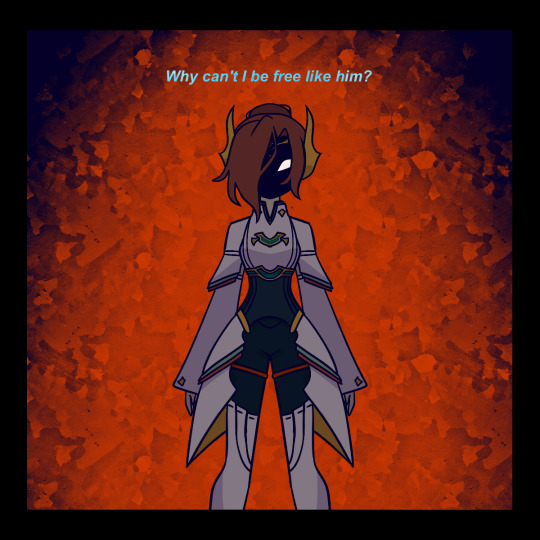
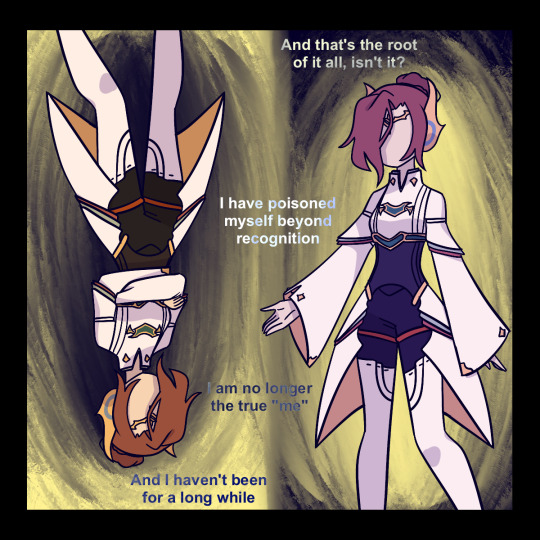
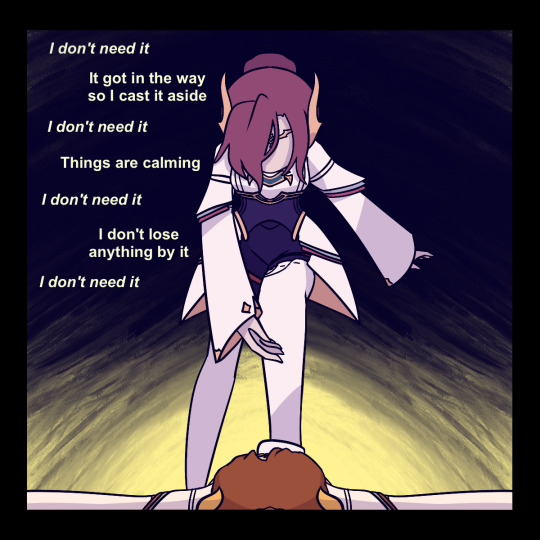

Got hit with sudden xbc3 brainrot and it motivated me to finally make the comic idea I got after completing Alexandrias ascension quest!
#i love alex so much shes SO fucked up#her ascension quest was a total whirlwind of emotions#and her dynamic with valdi is so interesting#like yeah shes pissy bc he totaled her colony that one time#but hes also the walking anthesis of everything shes centered herself around#alex works by delegation and detachment- purposefully keeping herself at a distance from others#to protect her people#by making herself appear as an immovable opponent#and alex is constantly hyper-aware of everyones doings and inner workings#bc shes paranoid and only confident in her usefullness#while valdi is the exact opposite#hes barely a commander and he doesnt organize. at all.#hes oblivious and scatterbrained- simple-minded#hes forgiving to a fault and always sees only the best parts of people until their faults are glaring him in the facr#and its not that hes stupid- he KNOWS people have flaws and he does see them#he just doesnt care#sorry for ranting i have too many thoughts#alexandria#valdi#xenoblade chronicles#xenoblade chronicles 3#xbc#xbc3#not tagging spoilers anymore bc its been out for like 5 months#art#my art#xanders art#xanders haunting art#digital art#fan art
42 notes
·
View notes
Text

Girls when the end of Sketchbook Week fills them with a melancholic yet unimaginable gratefulness and a contradictory nostalgia for the present moment. Girls when the feeling of community that was already there was enhanced by an event and they're emotional over people on their phone
#you guys. fucking broke me#like yeah I KNEW everyone here was awesome and kind and sweet and talented#but there's something about the organized coming together of it#it feels like the internet equivalent of everyone accepting to hang out together outside of just seeing each other in school/work#to everyone who commented/reblogged my works or just interracted in some way with me during this week#I hope you know how incredibly grateful i am. I hope you know I think of you as a friend (ESPECIALLY the mutuals)#I've never taken more comfort in the saying 'shows end. But fandoms last forever'#but I hope you know you can reach out even when you no longer think too much about hilda#I'm just. so humbled. Like this common interest brought all these amazing people together. Now we can stick by each other#even when there's no longer this common denominator#(which is going to take me a WHILE to leave behind either way don't know about you)#anyway. yeah. I'm happy to share these moments of my life with you people. you are alright [I say as I bawl my eyes out]#wife speaks#not hilda
8 notes
·
View notes
Note
Could Light be a good father if he has a normal life without death note?
In my opinion, yes. I think Light as a character isn't meant to be seen as an inherently unhinged and evil person just waiting to snap. I think he's meant to be seen as somebody who would've led a fairly ordinary and upstanding life had he never come in contact with the notebook, which is sort of the irony and the horror of the situation and his character development much of the time (because it suggests that the potential for that kind of terrible behaviour could exist even amongst people with good intentions and decent prospects and upbringings and very little trauma in their childhoods to speak of and everything else). It might somewhat depend on your definition of a "good parent," but I think that he would at the very least be a dutiful and responsible parent and take the idea of being a father and a role model pretty seriously. I imagine he'd model himself after his own parents in a lot of his values and ideals and decisions. Probably would be a very busy and hard-working parent, maybe a bit overly strict and hard to please and somewhat emotionally unavailable, but also very steady and meticulous and reliable when providing the things he felt were his responsibility to do for his kids. Even if he didn't always feel like being there for them he would still show up every day and do his part to the best of his ability, because that's the way he thinks and the kind of person he is.
#ask#anon#light yagami#meta#p#in a way i feel he'd maybe almost be more like a sachiko parent that a soichiro parent?#i think soichiro might be more emotionally demonstrative and waver more in how he defines his responsibilities toward his kids and as a dad#than light would?#light kinda has everything very organized and planned out privately in advance and then just does it without expressing any doubts about it#or consulting other people about what the best thing to do would be#and keeps much of his emotions and decision making processes to himself most times#which seems a bit more like sachiko than soichiro idk#mostly there to provide and be steady and action oriented with the practical stuff and whatnot#i just think soichiro would discuss things more and doubt himself more and stress about what he's meant to be doing as a dad more#and be more open to discussion about it#than light#light's number one thing is to always seem like he knows exactly what he's doing and has everything already figured out for himself#and this would probs extend to his parenting as well#and i feel like maybe sachiko as a mom might be a bit like that too idk she just seems to be 100% on top of her duties#and very organized and reliable#but a bit more private about most emotional stuff
23 notes
·
View notes
Text
ok here's the cottagecore rant lol
i'm definitely not the first person to complain about cottagecore and like the 'cottagecorification' of lesbians but i've just been thinking about it tonight and i feel like the two main facets of what irritate me about it are like:
the way it mysticizes femininity. like...i am generally skeptical of any form of gender essentialism but especially this whole "divine feminine" sort of rhetoric that i've seen floating around the internet, which essentially acts as though a proper response to the gender roles created by patriarchy is to take the gender role of "woman" and shout really loudly about how good it is, which like...i understand the desire to take historically stigmatized aspects of femininity and reclaim them and push back against stigmatizing narratives, but mysticizing feminity does nothing but take us back to gender essentialism, which will always inevitably take us back to a gender hierarchy, so it's like....idk babe read some audre lorde. master's tools will never dismantle the master's house and all that. like there is no inherent goodness to womanhood and portraying femininity as this dainty pretty thing isn't actually really doing anyone a favor in the long-run. also -- i feel like this ties in to the ways that people will sometimes talk about lesbians and lesbian relationships like "wow women are just so beautiful and magical and amazing and lesbians are just so perfect and lesbian relationships are all just so perfect" where it's like...k. tell me u don't see lesbians as people but make it woke ig.
the way it sanitizes lesbianism. and like again i am not the first person to complain about this but anytime i see lesbianism portrayed as just like "omg uwu cute picnics and matching little fairy outfits and watching the sunset together" i'm just like...i'm not 5 years old??? like it almost feels as if in trying to avoid lesbians being oversexualized we've just decided to turn them into a children's picture book?? and it's like....idk babe u do u but if this is your impression of what being a lesbian is about then....yikes.
and the thing is like this combo of mysticizing femininty and sanitizing lesbianism i think leads to this weird anti-masculinity sentiment within queer and wlw spaces where people will be like "feminine = good and masculine = bad" and then we get all these "jokes" where people just repeat the same rhetoric about masculine lesbians being creepy ugly predators and it's like....i am literally going to rip ur spine out. i am. going to kill you. seriously the fucking "hey mamas" jokes and shit?? ohhhh i could go on and on maybe i just need to make a separate rant for that but yeah. making fun of masculine lesbians is literally only ever punching down and if you don't understand that then u have an incredibly warped understanding of like queer politics and also have probably never studied even a crumb of queer history.
ANYWAY at the end of the day all of this also just goes back to like. turning queerness into an aesthetic for the consumption of a broad audience and this is an issue throughout queer spaces i think because people don't actually want to accept queerness they just want to consume it as a form of entertainment but with lesbians specifically it just sucks that the palatable aesthetic is always going to be some kind of hyperfeminine conventionally pretty little package that is either completely devoid of sexuality or sexualized in a way that is very consumable for nonlesbians. and it sucks when people within the queer community buy so heavily into that aesthetic without seeing the ways that boiling a sexuality down to an aesthetic is harmful. like -- it's okay to enjoy or identify with certain aspects of "cottagecore" like shit man i like picnics too and if ur into cute dresses and shit u do u but if your queer identity revolves around aesthetics then there is very little that is actually queer about it and you will likely struggle to actually be in community with those who don't fit into your sanitized and palatable narratives of what it means to be queer. so. work on conceptualizing queerness beyond aesthetics maybe!
#i feel like there are still thoughts buzzing around in my brain#but whatever this helped me organize them at least a little bit#there's just. so much to say about queerness and the way it's increasingly#boiled down to aesthetics in online spaces#like if your queernness begins and ends with a pinterest board u simply aren't as queer as you think u are i'm sorry#and it's like i know a lot of these people are probably young queers figuring things out#and it's understandable that the first representations of queerness ur encountering in online spaces are all like#boiled down aesthetics#but please please try to think beyond that too#queerness is about so much more than the way u fucking dress#or filming a cute date you went on with your gf to get likes on the internet#queerness is a fundamentally abrasive thing!!! it's not cute and fun a lot of the time!! it can be hard and gross and scary!!#anyway i need to stop talking these tags are just becoming a whole other essay my b#txt#ranting and raving
93 notes
·
View notes
Text
tbh tho this is EXACTLY what merfolk relationships look like
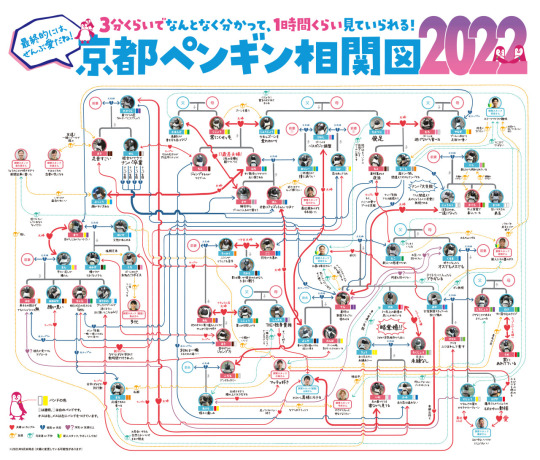
and they just keep track of this. in their heads. all the time.
#all the care guide says is 'biomass'#they dont have gendered pronouns but they do have tone modifiers for every other fucking word depending on their relationship to the other#and their mood. and if theyre referring to multiple people at once or just one person. and often layered on top of each other too.#merfolk have poor vision but they DO inherently think of things in a more ''three dimensional'' way than we do#considering they live underwater and youre operating with another axis just to move around anywhere#which then gets applied to the rest of their everything#ESPECIALLY language because theyre nerds who went hard into the sound focus#their visual art in comparison has simpler elements than ours (but a lot more focus on light/movement)#this is why merfolk have some very unique spellcrafts and theyre notorious for complicated and detailed spellwork#like yes a part of it is the fact that theyre older than the other species and have had more time to work on it#but also they can just DO really unique things compared to other cultures because they emphasize layered detail in this way#this is also why - from the outside - so much of miranda's job looks like parties and balls and attending to the courts#because again. its all about the emphasis on who has what relationship with who and how to operate within that.#legal agreements are multilayered and come with terms and conditions a mile long and you need to have a very careful hand on the pulse#of all of this#even moreso because royal families go even harder with treating the lineage as the individual and the merfolk#as just limbs and organs of this equation#this is why it was so important that miranda be good at manipulation and speaking and just *charismatic*#literally making people do what she wants or needs them to do is just what makes the merkingdom GO and operate#and why she (and the other royals) occupy a space a little like a public performer does as well#and why royals showing personal favor and having close personal relationships is frowned upon as#mixing pleasure and business#since those relationships ARE their business and so much of the underlying politics#if youre showing undue favor to someone because you personally just like them then you aren't judging them based off of actual talent#merfolk complicated! merkingdom complicated!#(the merkingdom is also SUPER fucked up but thats tangential from this tangent)
31 notes
·
View notes
Text
.
#word vomit alert!!!!!#i love solo trips out bc i get to do whatever i like without having to make conversation with people but omg.......#this trip has evoked alarming levels of loneliness and melancholy for some reason#maybe it's got something to do with just seeing Too Many People at once... and seeing people live their lives and enjoy company#n then i see myself n while i see an independent carefree person who's at peace with herself there's also a tinge! of! melancholy n pining..#for companionship... for easy conversations... for connections!#i was also listening to Fourever while roaming around aimlessly and when Happy started playing i immediately teared up#i think i just have too many things on my mind djskfksmmdskkd i need to get back to journaling n meditating. too much anxious energy#also during dinner i sat next to a couple who seemed to be on their first date post dating app conversation. n it reminded me of my prev rs#dkfkfnmsfndnmdm i wouldn't call it ptsd bc they were good memories but personally i would most likely never use a dating app ever again.....#it's just too much pain having to talk through icebreakers n get to know each other with the topic of Dating already looming in the bg#n it's just a lot of Work for a first date you know??? anyway i'm tired of relationships. i would love organic platonic companionship tho#like i would love more friends. just not a Partner shdkfjdndndmd#but with that said !!!! it's sometimes lonely being single. but the thing is. there's no company that i'd prefer more than my own#i bring too much joy and peace to myself that i feel like it's almost impossible for anyone to meet those standards#it's very much like that tiktok where op said her app guy asked her who his competition was and she answered: Myself. your competition is me#and that was just the truest thing i've seen#also met an unkind worker at dinner. wasn't directed at me but the energy he gave off was just so Bad that it ruined my evening KDKDJSKDK#like . how can someone be so miserable n unkind n mean to the people around him??? as if they aren't deserving of respect... it boggles me#n so todays trip has been so . strange. i felt sad! witnessed unkindness! i felt a little lonely!#i unknowingly self-reflected a lot n probably spiralled into a rumination cycle! thought abt work n how it seemed like there was No Way Out#but !! it is what it is!!!
2 notes
·
View notes
Text
i have so much work to do for finals season which is frustrating bc on the one hand i'm very glad all my classes have project-based finals where i get to be creative instead of just doing an exam or a paper. however. i have a bad habit with every project-based final ever of accidentally getting an idea that's way too ambitious and creating more work for myself than i need to do
however this semester even tho i fell into that exact same trap my two most elaborate final projects each involve 1. editing a video essay which contains an interview i did with paul bellini and at least 45 seconds of it are bellini talking about why he thinks i have great potential as a comedian, and 2. editing a ten minute reel of the documentary footage i got on tour with scott. which of course involves rewatching various videos of me and scott being extremely chaotic together. so i stay winning ig
#my other finals include ''powerpoint presentation detailing the historical significance of mel brooks the producers''#and ''live sketch show that i actually don't have a significant role in but that's fine i have a different sketch class next semester''#(this sketch class was technically ''creating characters and solo performances'' and i really wish i could've done more)#(but also that whole interview-footage-debacle drained so much of my creative energy so sometimes doing the bare minimum is self care)#so i don't have a solo piece in the show. but i do get to say my favorite line in the whole show in a group sketch which is great#and i did sign up to perform an aubrey monologue in a sketch show in a suburb of boston next week#which is gonna be super interesting bc i've been looking to do more performing outside of my college#bc i've found that i don't think college kids are actually my target audience??? or at the very least i want to perform to a wider audience#it's frustrating bc for that show i have to trim the monologue down to 3 minutes but it's the tightest monologue i have and it's 5 minutes#so trimming it down feels like a game of jenga since it's so tight lmao#but honestly even if the performance bombs i'm mostly doing this so i can tell bellini about it lmao#he's so supportive of my comedy and he's been such a great help with my aubrey monologues i feel like this is bellini homework lmao#anyway i probably won't post the video essay publicly bc it's not the style of video essays i want to make#and it's too specific to the class it's for#but if people are interested in watching it i'll send you the vid when it's done#and for the tour video i'll probably post that or at least some version of it#bc that's just gonna be a fun teaser of ''here's the level of behind-the-scenes content you'll be getting from this doc!!''#and also a fun way to be like. audiences don't know me nearly as well as they know scott#but they will definitely know me by the end of this bc there are so many wild interactions i have on camera of me and scott being chaotic#anyway this post was mostly to organize my thoughts of what i still have to do this week#i am so ready to be done with school lmao i'm gonna be spending a full month in toronto this summer#and it's shaping up to be such an exciting time i can't wait
6 notes
·
View notes